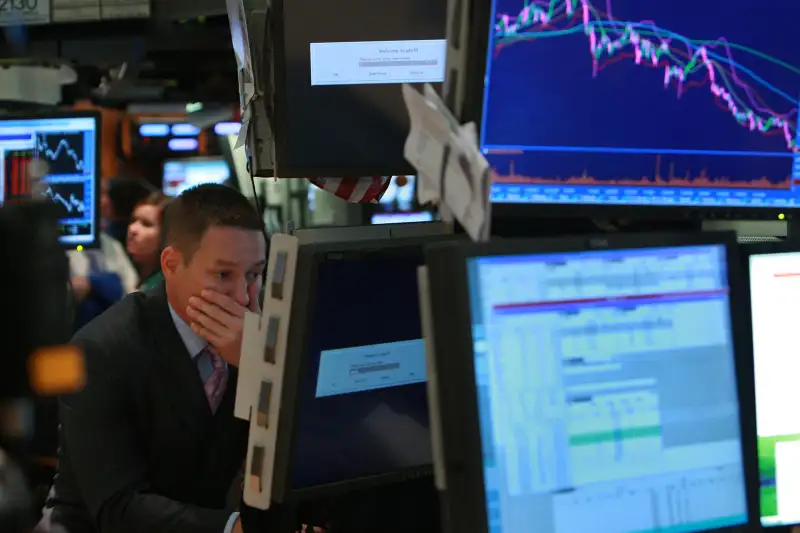4 Steps to Make Sure Your Retirement Plan Is Ready for Anything—Even a Market Crash
Money is not a client of any investment adviser featured on this page. The information provided on this page is for educational purposes only and is not intended as investment advice. Money does not offer advisory services.

Chances are your retirement prospects have improved in recent years. Even if you haven't been knocking the cover off the ball when it comes to saving, your retirement accounts have probably been growing nicely due to the double-digit annualized gains stocks have churned out over the past nine years.
But have you considered how your outlook for a secure retirement might change if this aging bull market stalls — or, worse yet, takes a big dive?
Just to be clear: I'm not predicting an imminent crash.
Even when valuations are stretched as they are now, stocks can still continue climbing to new highs for months or even years. And many investment analysts expect it to do just that.
But it's important to remember that forecasts aren't certainties, and sustained run-ups like the one we've been experiencing at some point often end with stocks going into a deep and prolonged funk.
Which is why it's important to give your retirement strategy a stress test of sorts while things are still going swimmingly.
That way you can get a sense of how your retirement prospects might change — and what adjustments you might consider making — should the market's sizzle turns to fizzle.
Step 1: Get a fix on your asset allocation.
In other words, assess how your retirement savings is divvied up between stocks, bonds, and cash. This will largely determine what will happen to your nest egg's value if the market tanks.
Don't just guess or assume you know what your current asset mix is based on where you set it in the past.
The fact is, your portfolio could be a lot more stock heavy than you think if you haven't been rebalancing over the years. So you want to go over your holdings individually to see how much of each is invested in stocks, bonds, and cash. And then based on that, determine what percentage of your savings overall falls into each of those categories.
Step 2: Use recent downturns as a guide.
No one knows what the next market setback will look like. But for the purposes of this stress test, you can turn to recent sell-offs to provide context.
For instance, from the market's pre-financial-crisis highs in October 2007 to its low point in March 2009, stocks lost roughly 55%, while the broad bond market gained about 7.5%.
This means that if you have, say, 80% of your retirement savings invested in stocks and 20% in bonds — an allocation that would be appropriate for someone with 20 or more years to go until retirement — and the market has a setback similar in magnitude to the one it suffered during the financial crisis, you might see the value of your nest egg drop by roughly 40%.
If you have a more conservative asset mix, say, 50% stocks and 50% bonds — a mix that would be typical for many retirees — the decline would be smaller, or a bit less than 25%.
Of course, these figures are rough approximations. For example, I haven't factored in investment expenses or rebalancing.
But the point of this exercise isn't to try to predict an outcome with absolute precision; it's to arrive at a ballpark estimate of where you might stand in the event of another market meltdown.
Step 3: Gauge how such a setback might affect your plans.
To make that assessment, you can go to T. Rowe Price's Retirement Income Calculator.
Enter such information as your age, income, the percentage of pay you're saving each year, your current asset mix, the age at which you plan to retire and the current value of your nest egg. The tool will give you an estimate of the probability you'll be able to retire on schedule.
Then substitute the current value of your nest egg with your estimate of its value after a market setback. That will let you see the extent to which your chances of achieving a secure retirement might decline.
So, for example, if you're 40, earn $75,000 a year, save 10% of pay annually, plan to retire at 65 and have $250,000 saved in a mix of 80% stocks and 20% bonds, the tool would estimate that you have about a 70% chance of retiring at 65 on 75% of your pre-retirement income.
Plug in the estimated value of your savings after a major market setback — in this case, $150,000, assuming a 40% drop in your nest egg's value given an 80% stocks-20% bonds asset mix — and you'll see that the tool's estimate of your chances of retiring at 65 drop from 70% to about 60%.
That sort of decline shouldn't be surprising in the wake of a major market rout, and it doesn't necessarily mean you have to take drastic action.
Step 4: Figure out your best move.
If you've still got decades to go before you retire, for example, you probably wouldn't want to shift to a much more conservative portfolio in hopes of mitigating the effect of a market setback, as doing so would likely reduce long-term growth potential of your savings — which could lower your chances of achieving a secure retirement even more.
A more effective response would be to try to save more, especially if you've been slacking off and effectively relying on market gains to do a good part of your saving for you in recent years.
In the scenario above, even after a 40% drop in the value of the nest egg, increasing your savings rate from 10% to 15% raises the chances of success back to where it was before the market setback.
If you're on the verge of retiring or you've already retired, the aim of this exercise is to help you get an idea of how much a market slump might affect the level of annual income you can pull from your nest egg without depleting it too soon.
To gauge that, use the retirement income tool to estimate a sustainable withdrawal rate based on your nest egg's current value, and then compare that figure to the rate based on your nest egg's projected value after a market downturn.
If the amount you can safely withdraw declines significantly, one option is to scale back your stock holdings now to mitigate the effect a market crash would have on the value of your savings.
And such a move might make sense if you're investing especially aggressively as you head into retirement — say, with somewhere north of 60% of your savings in stocks. But you don't want to invest too conservatively, as doing so might make it more difficult to maintain your purchasing power over a long retirement.
So assuming you're already investing reasonably given your risk tolerance and and other factors — which you can gauge by completing a risk tolerance/asset allocation questionnaire — you'll want to focus mostly on spending. More specifically, look at ways you may be able to pare outlays and reduce withdrawals from savings to give your nest egg a chance to recover lost ground.
Doing a retirement budget can give you some insights into areas where you might be able to cut back. You can also consider other possibilities for lowering expenses, such as downsizing or relocating to an area with lower costs, or boosting income, such as working part-time or taking out a reverse mortgage.
The idea is to have a variety of moves and strategies you can put in motion quickly should you need to do so.
Bottom line: We can't predict when a bull market will stumble or know for certain how severe the ensuing bear market will be. But giving your retirement planning a stress test before the market slumps and thinking cooly and rationally about how to react will put you in a much better position to weather any crisis than making decisions on the fly while you're under duress.
Walter Updegrave is the editor of RealDealRetirement.com. If you have a question you would like Walter to answer online, send it to him at walter@realdealretirement.com. You can tweet Walter at @RealDealRetire.
More From RealDealRetirement.com: You Know How Much You Need To Save For Retirement? Maybe It's Time For A Reality Check
